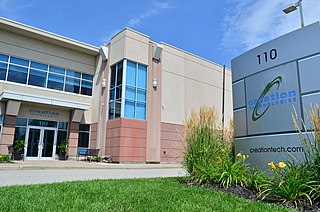
The United States Food and Drug Administration is a federal agency of the Department of Health and Human Services. The FDA is responsible for protecting and promoting public health through the control and supervision of food safety, tobacco products, caffeine products, dietary supplements, prescription and over-the-counter pharmaceutical drugs (medications), vaccines, biopharmaceuticals, blood transfusions, medical devices, electromagnetic radiation emitting devices (ERED), cosmetics, animal foods & feed and veterinary products.
An epinephrine autoinjector is a medical device for injecting a measured dose or doses of epinephrine (adrenaline) by means of autoinjector technology. It is most often used for the treatment of anaphylaxis. The first epinephrine autoinjector was brought to market in 1983.
Abbott Laboratories is an American multinational medical devices and health care company with headquarters in Abbott Park, Illinois, United States. The company was founded by Chicago physician Wallace Calvin Abbott in 1888 to formulate known drugs; today, it sells medical devices, diagnostics, branded generic medicines and nutritional products. It split off its research-based pharmaceuticals business into AbbVie in 2013.

The United States Federal Food, Drug, and Cosmetic Act is a set of laws passed by the United States Congress in 1938 giving authority to the U.S. Food and Drug Administration (FDA) to oversee the safety of food, drugs, medical devices, and cosmetics. A principal author of this law was Royal S. Copeland, a three-term U.S. senator from New York. In 1968, the Electronic Product Radiation Control provisions were added to the FD&C. Also in that year the FDA formed the Drug Efficacy Study Implementation (DESI) to incorporate into FD&C regulations the recommendations from a National Academy of Sciences investigation of effectiveness of previously marketed drugs. The act has been amended many times, most recently to add requirements about bioterrorism preparations.

The Food and Drug Administration's (FDA) New Drug Application (NDA) is the vehicle in the United States through which drug sponsors formally propose that the FDA approve a new pharmaceutical for sale and marketing. Some 30% or less of initial drug candidates proceed through the entire multi-year process of drug development, concluding with an approved NDA, if successful.
An approved drug is a medicinal preparation that has been validated for a therapeutic use by a ruling authority of a government. This process is usually specific by country, unless specified otherwise.
Clinical research is a branch of healthcare science that determines the safety and effectiveness (efficacy) of medications, devices, diagnostic products and treatment regimens intended for human use. These may be used for prevention, treatment, diagnosis or for relieving symptoms of a disease. Clinical research is different from clinical practice. In clinical practice established treatments are used, while in clinical research evidence is collected to establish a treatment.
Structured Product Labeling (SPL) is a Health Level Seven International (HL7) standard which defines the content of human prescription drug labeling in an XML format. The "drug labeling" includes all published material accompanying a drug, such as the Prescribing Information which contains a great deal of detailed information about the drug. As of Release 4 of the SPL standard, 22,000 FDA informational product inserts have been encoded according to the standard.
Drug Master File or DMF is a document prepared by a pharmaceutical manufacturer and submitted solely at its discretion to the appropriate regulatory authority in the intended drug market. There is no regulatory requirement to file a DMF. However, the document provides the regulatory authority with confidential, detailed information about facilities, processes, or articles used in the manufacturing, processing, packaging, and storing of one or more human drugs. Typically, a drug master file is filed when two or more firms work in partnership on developing or manufacturing a drug product. The DMF filing allows a firm to protect its intellectual property from its partner while complying with regulatory requirements for disclosure of processing details.
DailyMed is a website operated by the U.S. National Library of Medicine (NLM) to publish up-to-date and accurate drug labels to health care providers and the general public. The contents of DailyMed is provided and updated daily by the U.S. Food and Drug Administration (FDA). The FDA in turn collects this information from the pharmaceutical industry.

An epedigree is an electronic document which provides data on the history of a particular batch of a drug. It satisfies the requirement for a drug pedigree while using a convenient electronic form.

President of the United States George W. Bush signed the Food and Drug Administration Amendments Act of 2007 (FDAAA) on September 27, 2007. This law reviewed, expanded, and reaffirmed several existing pieces of legislation regulating the FDA. These changes allow the FDA to perform more comprehensive reviews of potential new drugs and devices. It was sponsored by Reps. Joe Barton and Frank Pallone and passed unanimously by the Senate.
Documentum is an enterprise content management platform, now owned by OpenText, as well as the name of the software company that originally developed the technology. EMC acquired Documentum for US$1.7 billion in December, 2003. The Documentum platform was part of EMC's Enterprise Content Division (ECD) business unit, one of EMC's four operating divisions.
The following outline is provided as an overview of and topical guide to clinical research:
The Unique Device Identification (UDI) System is intended to assign a unique identifier to medical devices within the United States, Europe, China, South Korea, Saudi Arabia and Taiwan. It was signed into law in the US on September 27, 2007, as part of the Food and Drug Administration Amendments Act of 2007.
Regulated Product Submission (RPS) is a Health Level Seven (HL7) standard designed to facilitate the processing and review of regulated product information. RPS is being developed in response to performance goals that the U.S. Food and Drug Administration (FDA) is to achieve by 2012, as outlined in the Prescription Drug User Fee Act (PDUFA). In addition to the U.S., regulatory agencies from Europe, Canada, and Japan are at varying levels of interest and participation. Currently, the second release of RPS is in development.

Creation Technologies is a global electronics manufacturing services (EMS) provider headquartered in Boston, Massachusetts, United States.
QIAGEN Silicon Valley is a company based in Redwood City, California, USA, that develops software to analyze complex biological systems. QIAGEN Silicon Valley's first product, IPA, was introduced in 2003, and is used to help researchers analyze omics data and model biological systems. The software has been cited in thousands of scientific molecular biology publications and is one of several tools for systems biology researchers and bioinformaticians in drug discovery and institutional research.

Sproxil is an American venture capital-backed for-profit company based in Cambridge, Massachusetts that provides a consumer product verification service to help consumers avoid purchasing counterfeit products. The service was the first Mobile Authentication Service (MAS) to launch in Nigeria.

Mettler Toledo is a multinational manufacturer of scales and analytical instruments. It is the largest provider of weighing instruments for use in laboratory, industrial, and food retailing applications. The company also provides various analytical instruments, process analytics instruments, and end-of-line inspection systems. The company operates worldwide with 70% of net sales, derived in equal parts, from Europe and from the Americas. Asian business is included in the remaining 30%. Mettler Toledo is headquartered in Switzerland and incorporated in the United States.






